Strictly Personal
The UN’s failures require a new path in Libya, By Khaled Assari
Published
1 year agoon
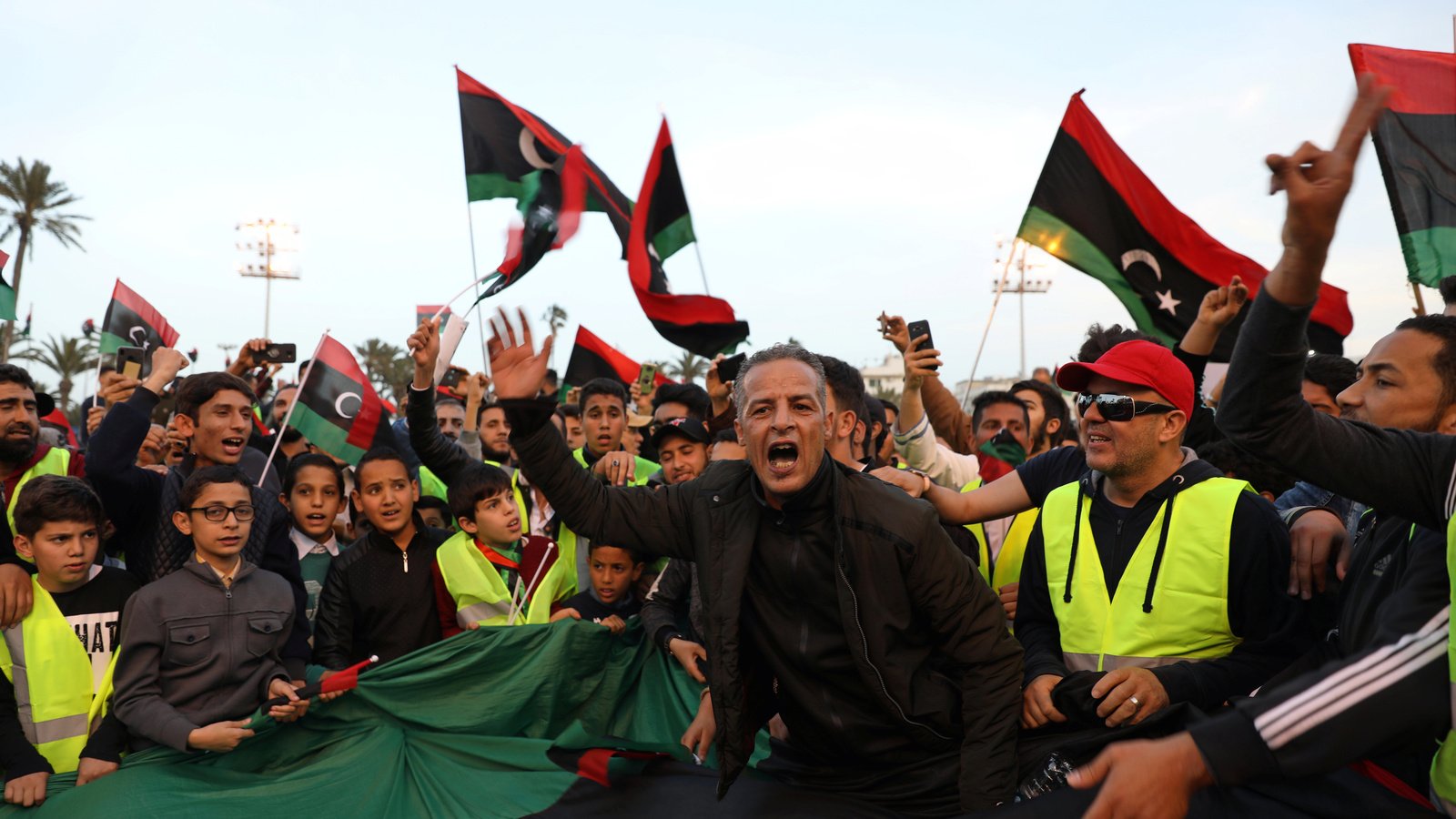
The UN Support Mission in Libya (UNSMIL) has failed in nearly every conceivable objective. Its shortcomings are concurrently structural and individual: a poorly designed mandate, an almost total disregard for Libyan political history, and a rapid turnover of personnel. The lack of progress on the ground is wholly unsurprising.
It is beyond time to move past the UN’s bureaucratic holding-pattern strategy and damaging “cookie-cutter” political formulae that simply don’t fit and therefore won’t work no matter how many times they are tried. Libya is deeply tribal and factional. To be viable, the solution in Libya can only result from engaging robustly with Libya’s unique history to ensure it contains the necessary ingredients of national identity to be sufficiently unifying.
UNSMIL was established shortly after the end of Libya’s First Civil War. Muammar Gaddafi, Libya’s long-time dictator, was deposed in a brief internal conflict. Libya’s rebels received extensive air support from NATO along with intelligence and arms assistance from the most powerful Arab states, particularly Qatar and the UAE. Initially, the Libyan case was held up as an exemplary post-Iraq reaction, with the United States “leading from behind” and avoiding any ground commitment.
Western air and naval assets, impervious to a response from Gaddafi’s forces, dismantled their enemy through a series of precision strikes which enabled a loose coalition of anti-regime units to topple Gaddafi. Libyans themselves caused a transformation within their country, not the West. Leading from behind was, seemingly, a wiser approach than the past decade’s blunders.
After the military victory, the baton was handed to the UN to midwife Libya into a democracy. UNSMIL was meant to be a short political support mission, meant to lay the groundwork for free and fair elections. Elections would then create a new government that would appoint a president and pass a constitution, thus ensuring Libya’s long-term political stability.
UNSMIL’s fundamental mistake, however, was to assume that democracy would work in post-Gaddafi Libya even if devoid of situational context. Ironically a similar mistake was made in Afghanistan and Iraq.
In each of these cases, with the UN as the active and enthusiastic convener, there was a rush to a democratic transition that did not in fact result in democracy, but instead fuelled multiple rounds of conflict, entrenched political dysfunction, and even civil war because ill-conceived political structures simply reflected divisions within society, highlighting them served to deepen them, rather than create the necessary binding glue for a new more united political culture.
The form of democracy matters
There are different forms of democracy – parliamentary (many different models with several (e.g the UK, Sweden, Norway, Denmark etc) including a constitutional monarchy), presidential (a variety of different models) and semi-presidential (slightly less common but again a number of different models).
Just like switching round the French Presidential model and the UK’s Parliamentary model (a constitutional monarchy) would likely result in political and institutional dysfunction in both countries, imposing forms of democracy in Libya, Afghanistan and Iraq, that have little connection to each country’s own and unique national political history and demography is clearly a recipe for democratic failure. The lesson is that the form of democracy matters.
In this light, the General National Congress (GNC)—Libya’s elected transitional government—simply reflected the divisions within Libyan society between the country’s west and east, Islamists and secularists, liberals and conservatives. UNSMIL oversaw and endorsed this process, all without engaging in the development of a new Libyan security system.
The combination of UN inattention and a political structure without any organisational coherence created the space for newly-elected leaders to create private militias. By 2014, when the GNC unilaterally extended its mandate, its credibility had completely vanished, opening the way to a second civil war.
The GNC’s failings, meanwhile, were entirely predictable in light of Libyan history. Libya was politically stable from independence in 1951 until 1969, under a democratic constitutional monarchy headed by King Idris al-Senussi, the head of the Senussi Sufi religious order that had brought sanity and unity to the country over the previous century. The Senussi had eliminated the Libyan slave trade, brought enough social stability to enable economic flourishing, resisted French and Italian imperialism, supported the Allies during the Second World War and in doing all, helped build a strong but fledgling national identity.
King Idris established a system that gave Libyans space and time to acclimate to democratic structures, via a parliamentary democracy, while taking the core issue of national unity out of the realm of debate. The 1951 Libyan Constitution’s broad protections for freedom of speech, religion, and conscience created a fundamentally liberal character of the state. Idris’ success and fundamental fairness as ruler explains his popularity, which continues to this day, despite Gaddafi’s concerted effort to wipe him from history. UNSMIL never recognised this history, and never once engaged with Libya’s political past or the lessons of what it could offer for the present.
Libya’s Second Civil War was the result of a system that failed. The Tripoli-based Government of National Accord (GNA), the successor to the GNC, and the Tobruk-based House of Representatives, comprised of delegates elected in 2014, split the country. Politics became yet another area of contestation over fundamental differences between Libya’s internal actors. But despite the second war, UNSMIL’s mandate was not changed. Nor was its director given more time to become familiarised with the country. Every UNSMIL chief has been rotated after one year.
Indeed, one of the most recent diplomats charged with leading UNSMIL, Stephanie Williams, did her most effective work during her unexpected acting extended term at UNSMIL. Her successor, Jan Kubis, resigned on the eve of the Libyan elections in 2021, reportedly because his impending retirement meant he was not willing to leave the comfort of European diplomatic residences to engage on the ground.
UNSMIL’s current leader, African Union-backed Abdoulaye Bathily, reportedly has a brusque manner; but he is at least actually committed to his job. Nevertheless, the fact that the African Union has been given a significant stake in Libyan affairs through its preferred appointee is bizarre, as Libya is fundamentally a Mediterranean issue. Europe, North Africa, and the Middle East should take the lead, but has wasted its last shot.
Libya’s Second Civil War ended in 2020. But its two key factions still receive external support, primarily from Russia and Turkey, as well as attention from the international community. The pause on large-scale violence stems more from Turkish and Russian preoccupation with other issues—chief among them Ukraine— than a durable peace settlement. Re-escalation is possible at any time, with the attendant risks of refugee flows, broader terrorist attacks, and disruption to Mediterranean commerce and oil exports.
Moreover, as Sudan’s crisis escalates, Libya will likely become a conduit for weapons and other support. After all, the LNA’s Khalifa Haftar has provided the Sudanese Rapid Support Forces – the group now in control of Khartoum – with weapons since 2019, likely with Russian backing.
A new path forward would involve two major differences.
First, whether under UNSMIL or another body, an external stabilising force must be charged with a broader mandate that includes security stabilisation and have long-term staff. Rotating leadership every 12 months is deleterious to any effective negotiations.
Second, and most critically, stabilisation efforts must reconceptualize their understanding of a political settlement. The goal is not to broker a sustainable ceasefire. This logic will lead to a rerun of 2011-2014, where the government became a battleground for factional interest that made renewed conflict nigh inevitable. Rather, the goal should be to create and provide support for a government that is legitimately independent of Libyan factionalism, that unites the Libyan people, and that has the authority and means to act against threats to the country, the greatest of which will remain non-state armed groups with international backing.
The only government that can serve in this independent fashion is the democratic constitutional monarchy, which attunes with Libya’s history. Any organisation engaged in Libyan political development must draw off the wealth of respect that the Senussi still command and create a system that removes the most fundamental questions of state from political debate. The monarchy remains Libya’s path to democracy. In fact, in a very recent poll by the online Libyan news channel Akhbarlibya24, over 83% of voters back this option. It’s time the UN started to listen to ordinary Libyans as opposed to just its self-serving political incumbents.
You may like
-


UN warns Sudan rebels may be getting weapons in Chad from UAE cargo planes
-
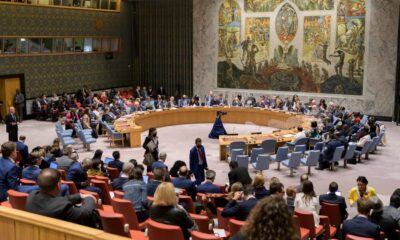

UN Security Council deliberates stance on Sudan war
-
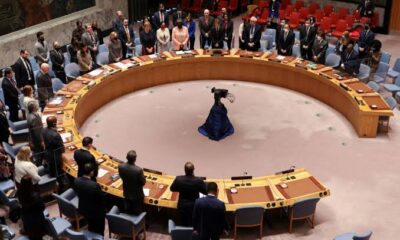

Nigeria gets backing of West African countries in bid to join UN security council
-
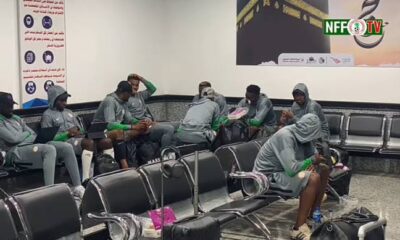

Reports say Libyan authorities have begun mass arrest of Nigerians following CAF verdict
-
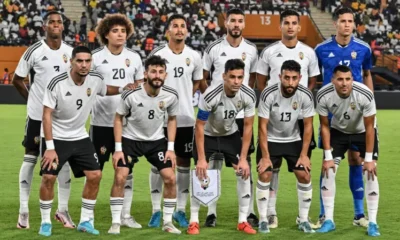

Libya vows to appeal CAF’s sanctions over botched Afcon match with Nigeria
-


CAF awards Nigeria 3-0 victory against Libya following ill-treatment
Strictly Personal
Let’s merge EAC and Igad, By Nuur Mohamud Sheekh
Published
4 weeks agoon
November 27, 2024
In an era of political and economic uncertainty, global crises and diminishing donor contributions, Africa’s regional economic communities (RECs) must reimagine their approach to regional integration.
The East African Community (EAC) and the Intergovernmental Authority on Development (Igad), two critical RECs in East Africa and the Horn of Africa have an unprecedented opportunity to join forces, leveraging their respective strengths to drive sustainable peace and development and advance regional economic integration and promote the African Continental Free Trade Area (AfCFTA).
Already, four of the eight Igad member states are also members of the EAC and, with Ethiopia and Sudan showing interest, the new unified bloc would be formidable.
Igad’s strength lies in regional peacemaking, preventive diplomacy, security, and resilience, especially in a region plagued by protracted conflicts, climate challenges, and humanitarian crises. The EAC, on the other hand, has made remarkable strides in economic integration, exemplified by its Customs Union, Common Market, and ongoing efforts toward a monetary union. Combining these comparative advantages would create a formidable entity capable of addressing complex challenges holistically.
Imagine a REC that pairs Igad’s conflict resolution strengths with the EAC’s diplomatic standing and robust economic framework. Member states of both are also contributing troops to peacekeeping missions. Such a fusion would streamline efforts to create a peaceful and economically prosperous region, addressing the root causes of instability while simultaneously promoting trade investment and regional cooperation.
These strengths will be harnessed to deal with inter-state tensions that we are currently witnessing, including between Ethiopia and Somalia over the Somaliland MoU, strained relations between Djibouti and Eritrea, and the continually deteriorating relations between Eritrea and Ethiopia.
The global economy experienced as a result of the COVID-19 pandemic, compounded by the Ukraine war and competing global crises, has strained donor countries and reduced financial contributions to multilateral organisations and African RECs. Member states, many of which are grappling with fiscal constraints, are increasingly unable to fill this gap, failing to make timely contributions, which is in turn affecting key mandate areas of Igad and EAC, and staff morale.
A merger between Igad and EAC would alleviate this financial pressure by eliminating redundancies. Shared administrative systems, integrated programmes, and a unified leadership structure would optimise resources, enabling the new REC to achieve more with less. Staff rationalisation, while sensitive, is a necessary step to ensure that limited funds are channelled toward impactful initiatives rather than duplicative overheads.
The African Union (AU) envisions a fully integrated Africa, with RECs serving as the building blocks of the AfCFTA. A unified EAC-Igad entity would become a powerhouse for regional integration, unlocking economies of scale and harmonising policies across a wider geographical and economic landscape.
This merger would enhance the implementation of the AfCFTA by creating a larger, more cohesive market that attracts investment, fosters innovation, and increases competitiveness. By aligning trade policies, infrastructure projects, and regulatory frameworks, the new REC could serve as a model for others, accelerating continental integration.
The road to integration is not without obstacles. Political will, divergent institutional mandates, and the complexity of harmonising systems pose significant challenges. However, these hurdles are surmountable through inclusive dialogue, strong leadership, and a phased approach to integration.
Member states must prioritise the long-term benefits of unity over short-term political considerations. Civil society, the private sector, the youth, and international partners also have a critical role to play in advocating for and supporting this transformative initiative.
The time for EAC and Igad to join forces is now. By merging into a single REC, they would pool their strengths, optimise resources, and position themselves as a driving force for regional and continental integration. In doing so, they would not only secure a prosperous future for their citizens and member states but also advance the broader vision of an integrated and thriving Africa.
As the world grapples with crises, Africa must look inward, embracing the power of unity to achieve its potential. A combined Igad-EAC is the bold step forward that the continent needs.
Nuur Mohamud Sheekh, a diplomatic and geopolitical analyst based in London, is a former spokesperson of the Igad Executive Secretary. X: @NuursViews
Strictly Personal
Budgets, budgeting and budget financing, By Sheriffdeen A. Tella, Ph.D.
Published
1 month agoon
November 20, 2024
The budget season is here again. It is an institutional and desirable annual ritual. Revenue collection and spending at the federal, State and local government levels must be authorised and guided by law. That is what budget is all about. A document containing the estimates of projected revenues from identified sources and the proposed expenditure for different sectors in the appropriate level of government. The last two weeks have seen the delivery of budget drafts to various Houses of Assembly and the promise that the federal government would present its draft budget to the National Assembly.
Do people still look forward to the budget presentation and the contents therein? I am not sure. Citizens have realised that these days, governments often spend money without reference to the approved budget. A governor can just wake up and direct that a police station be built in a location. With no allocation in the budget, the station will be completed in three months. The President can direct from his bathroom that 72 trailers of maize be distributed to the 36 states as palliatives. No budget provision, and no discussion by relevant committee or group.
We still operate with the military mentality. We operated too long under the military and of the five Presidents we have in this democracy, two of them were retired military Heads of State. Between them, they spent 16 years of 25 years of democratic governance. Hopefully, we are done with them physically but not mentally. Most present governors grew up largely under military regimes with the command system. That is why some see themselves as emperor and act accordingly. Their direct staff and commissioners are “Yes” men and women. There is need for disorientation.
The importance of budget in the art of governance cannot be overemphasized. It is one of the major functions of the legislature because without the consideration and authorisation of spending of funds by this arm of government, the executive has no power to start spending money. There is what we refer to as a budget cycle or stages. The budget drafting stage within the purview of the executive arm is the first stage and, followed by the authorisation stage where the legislature discusses, evaluates and tinkers with the draft for approval before presenting it to the President for his signature.
Thereafter, the budget enters the execution phase or cycle where programmes and projects are executed by the executive arm with the legislature carrying out oversight functions. Finally, we enter the auditing phase when the federal and State Auditors verify and report on the execution of the budgets. The report would normally be submitted to the Legislature. Many Auditor Generals have fallen victim at this stage for daring to query the executives on some aspects of the execution in their reports.
A new budget should contain the objectives and achievements of the preceding budget in the introduction as the foundation for the budget. More appropriately, a current budget derives its strength from a medium-term framework which also derives its strength from a national Development Plan or a State Plan. An approved National Plan does not exist currently, although the Plan launched by the Muhammadu Buhari administration is in the cooler. President Tinubu, who is acclaimed to be the architect of the Lagos State long-term Plan seems curiously, disillusioned with a national Plan.
Some States like Oyo and Kaduna, have long-term Plans that serve as the source of their annual budgets. Economists and policymakers see development plans as instruments of salvation for developing countries. Mike Obadan, the former Director General of the moribund Nigeria Centre for Economic and Management Administration, opined that a Plan in a developing country serves as an instrument to eradicate poverty, achieve high rates of economic growth and promote economic and social development.
The Nigerian development plans were on course until the adoption of the World Bank/IMF-inspired Structural Adjustment Programme in 1986 when the country and others that adopted the programme were forced to abandon such plan for short-term stabilisation policies in the name of a rolling plan. We have been rolling in the mud since that time. One is not surprised that the Tinubu administration is not looking at the Buhari Development Plan since the government is World Bank/IMF compliant. It was in the news last week that our President is an American asset and by extension, Nigeria’s policies must be defined by America which controls the Bretton Woods institutions.
A national Plan allows the citizens to monitor quantitatively, the projects and programmes being executed or to be executed by the government through the budgeting procedure. It is part of the definitive measures of transparency and accountability which most Nigerian governments do not cherish. So, you cannot pin your government down to anything.
Budgets these days hardly contain budget performance in terms of revenue, expenditure and other achievements like several schools, hospitals, small-scale enterprises, etc, that the government got involved in successfully and partially. These are the foundation for a new budget like items brought forward in accounting documents. The new budget should state the new reforms or transformations that would be taking place. Reforms like shifting from dominance of recurrent expenditure to capital expenditure; moving from the provision of basic needs programmes to industrialisation, and from reliance on foreign loans to dependence on domestic fund mobilisation for executing the budget.
That brings us to the issue of budget deficit and borrowing. When an economy is in recession, expansionary fiscal policy is recommended. That is, the government will need to spend more than it receives to pump prime the economy. If this is taken, Nigeria has always had a deficit budget, implying that we are always in economic recession. The fact is that even when we had a surplus in our balance of payment that made it possible to pay off our debts, we still had a deficit budget. We are so used to borrowing at the national level that stopping it will look like the collapse of the Nigerian state. The States have also followed the trend. Ordinarily, since States are largely dependent on the federal government for funds, they should promote balanced budget.
The States are like a schoolboy who depends on his parents for school fees and feeding allowance but goes about borrowing from classmates. Definitely, it is the parents that will surely pay the debt. The debt forgiveness mentality plays a major role in the process. Having enjoyed debt forgiveness in the past, the federal government is always in the credit market and does not caution the State governments in participating in the market. Our Presidents don’t feel ashamed when they are begging for debt forgiveness in international forum where issues on global development are being discussed. Not less than twice I have watched the countenance of some Presidents, even from Africa, while they looked at our president with disdain when issues of debt forgiveness for African countries was raised.
In most cases, the government, both at the federal and state cannot show the product of loans, except those lent by institutions like the World Bank or African Development Bank for specific projects which are monitored by the lending institutions. In other cases, the loans are stolen and transferred abroad while we are paying the loans. In some other cases, the loans are diverted to projects other than what the proposal stated. There was a case of loans obtained based on establishing an international car park in the border of the State but diverted to finance the election of a politician in the State. The politician eventually lost the election but the citizens of the State have to be taxed to pay the loan. Somebody as “Nigeria we hail thee”.
Transformation in budgeting should commence subsequently at the State and federal level. Now that local government will enjoy some financial autonomy and therefore budgeting process, they should be legally barred from contracting foreign loans. They have no business participating in the market. They should promote balanced budget where proposed expenditures must equal the expected revenues from federal and internal sources. The State government that cannot mobilise, from records, up to 40 percent of its total budget from IGR should not be supported to contract foreign loans. The States should engage in a balanced budget. The federal government budget should shift away from huge allocations to recurrent expenditure towards capital expenditure for capital formation and within the context of a welfarist state.
Sheriffdeen A. Tella, Ph.D.
EDITOR’S PICK


Moroccan annual inflation rises to 0.8% in November
Morocco’s statistics office has confirmed that the country’s annual inflation rate, as determined by the consumer price index, increased from...


Swiss company Mercuria partners Zambia’s IDC in new metals trading firm
According to a statement released by Swiss commodities trader, Mercuria, on Thursday, it has established a metals trading arm with...


Nigerian activist remanded in prison for threatening President’s son
A Nigerian court has ordered a female activist, Olamide Thomas, to be remanded in prison custody for allegedly issuing a...


Zambian law association kicks over suspension of two members
The Law Association of Zambia (LAZ) has kicked against the suspension of two of its council members, Arnold Kaluba, the...


FIFA Ranking: Nigeria ends 2024 as fifth best team in Africa
Nigeria’s men’s football national team, the Super Eagles, ended the year 2024 as the fifth best team in Africa in...
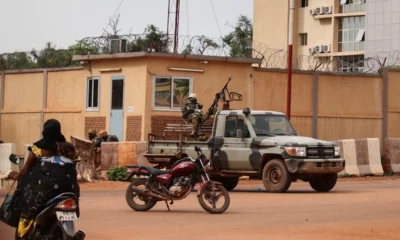

Burkina Faso releases 4 French spies after Moroccan intervention
In a diplomatic spat over their imprisonment, France and Morocco announced Thursday that four French nationals detained in Burkina Faso...
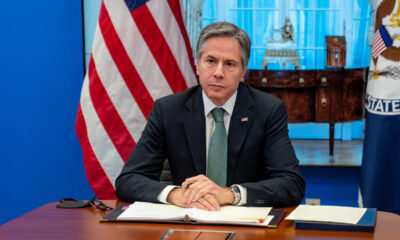

Blinken to reveal UN Sudan funding additions
Additional financing for humanitarian aid to Sudan and initiatives to strengthen civil society in the nation, where a conflict has...


Tanzania tells IMF economy projected to grow by 6% in 2025
Tanzania’s economy is expected to grow by about 6% in 2025 from an estimated 5.4% growth in 2024, its finance...


Nigeria to auction underdeveloped oil and gas fields in 2025
In order to meet the nation’s commitment to the UN Sustainable Development Goals, Nigeria will prioritize the development of natural...


Ghana’s Supreme Court dismisses suit challenging anti-LGBT bill
Ghana’s Supreme Court has dismissed two separate suits challenging the legality of one of the proposed anti-LGBT legislations awaiting assent...
Trending
-

 Metro2 days ago
Metro2 days agoZambian law association kicks over suspension of two members
-

 Metro1 day ago
Metro1 day agoNigerian activist remanded in prison for threatening President’s son
-

 Sports2 days ago
Sports2 days agoFIFA Ranking: Nigeria ends 2024 as fifth best team in Africa
-

 VenturesNow22 hours ago
VenturesNow22 hours agoMoroccan annual inflation rises to 0.8% in November


